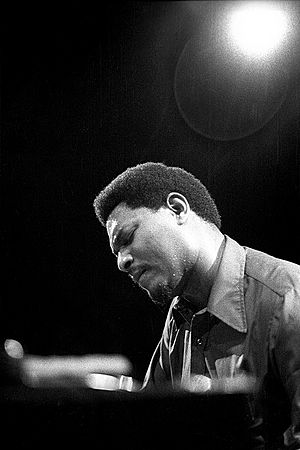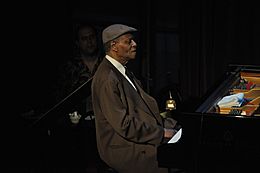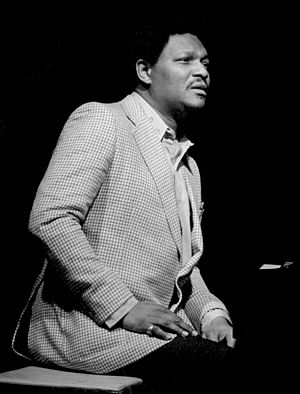McCoy Tyner facts for kids
Quick facts for kids
McCoy Tyner
|
|
|---|---|

Tyner in 1973
|
|
| Background information | |
| Birth name | Alfred McCoy Tyner |
| Born | December 11, 1938 Philadelphia, Pennsylvania, U.S. |
| Died | March 6, 2020 (aged 81) Bergenfield, New Jersey, U.S. |
| Genres | Jazz, avant-garde jazz |
| Occupation(s) | Musician, composer, bandleader |
| Instruments | Piano |
| Years active | 1960–2020 |
| Labels | Impulse!, Blue Note, Milestone, Telarc, McCoy Tyner Music |
| Associated acts | John Coltrane, Joe Henderson, Freddie Hubbard, Wayne Shorter, Hank Mobley, Stanley Turrentine |
Alfred McCoy Tyner (born December 11, 1938 – died March 6, 2020) was an American jazz pianist and composer. He was famous for his time with the John Coltrane Quartet from 1960 to 1965. After that, he had a long and successful solo career.
Tyner was honored as an NEA Jazz Master and won five Grammy Awards. Unlike many pianists of his time, he rarely used electric keyboards or synthesizers. Tyner's unique style made him one of the most recognized and important pianists in jazz history. Many other musicians have been inspired by his playing.
Contents
Early Life and Musical Beginnings
Tyner was born in Philadelphia, Pennsylvania, on December 11, 1938. He was the oldest of three children. His mother, Beatrice Tyner, encouraged him to play the piano. She even had a piano in her beauty salon.
He started piano lessons at age 13 at the Granoff School of Music. There, he also studied music theory and harmony. Within two years, music became the most important part of his life. Tyner was also inspired by bebop pianist Bud Powell, who lived nearby. Another big influence was Thelonious Monk, whose strong, percussive style helped shape Tyner's own sound. As a teenager, Tyner led his own band called the Houserockers.
When he was 17, Tyner became a Muslim through the Ahmadiyya Muslim Community. He changed his name to Suleiman Saud. He began playing music professionally in Philadelphia, becoming a part of the city's lively modern jazz scene.
Career Highlights and Famous Bands
Joining the John Coltrane Quartet
In 1960, Tyner first joined a group called The Jazztet, led by Benny Golson and Art Farmer. Six months later, he joined the famous quartet of John Coltrane. This group also included drummer Elvin Jones and bassist Steven Davis (who was later replaced by other talented bassists).
Tyner played on many albums that are now considered jazz classics. These include My Favorite Things (1961), A Love Supreme (1964), and Crescent (1964). The band toured almost constantly from 1961 to 1965.
While playing with Coltrane, Tyner also recorded his own albums as a leader. These were often piano trio recordings. Albums like Reaching Fourth (1963) showed his skill as a solo artist. He also played as a sideman on many Blue Note Records albums during the 1960s.
Developing His Unique Style
Tyner's piano style grew and changed while he worked closely with John Coltrane. Coltrane's music was very rich and full, and Tyner's piano playing matched this energy. One expert noted that Tyner found a way to play both chords and melodies at the same time. This made his playing supportive of Coltrane but also very original.
Tyner left Coltrane's group in 1965. Coltrane's music was becoming more experimental and less structured. Tyner felt he could no longer contribute to the music in a meaningful way. He said, "All I could hear was a lot of noise. I didn't have any feeling for the music."
Solo Career and New Sounds
After leaving Coltrane, Tyner started his own trio in 1966. He began a successful career as a bandleader. He released many albums with Blue Note Records from 1967 to 1970. These included The Real McCoy (1967) and Expansions (1968).
He later signed with Milestone Records. His albums from this period, like Sahara (1972) and Enlightenment (1973), were very influential. Tyner often used elements from African and East Asian music in his work. On Sahara, he even played the koto, a Japanese string instrument.
These albums showed innovative jazz from the 1970s. They were different from both fusion and free jazz. On his 1975 album Trident, Tyner played the harpsichord and celeste. These instruments are rarely heard in jazz music.
Throughout the 1980s and 1990s, Tyner often performed with a trio. He also recorded several solo piano albums for Blue Note, such as Revelations (1988). Later, he recorded with different trios for Telarc. In 2008, he toured with a quartet.
Influence and Playing Style

McCoy Tyner is known as one of the most important jazz pianists of the late 20th century. He earned this reputation during and after his time with John Coltrane.
Tyner was left-handed, and he played with a strong, deep bass sound in his left hand. He would often raise his arm high above the keyboard for a powerful attack. His right-hand solos were clear and detached. His melodies were rich, ranging from raw blues to complex pentatonic scales. His way of playing chords, especially using fourths, greatly influenced other jazz pianists like Chick Corea. Some of his harmonic techniques have even been compared to the classical composer Claude Debussy.
Awards and Recognitions
Tyner received many awards for his contributions to jazz. In 2002, he was named an NEA Jazz Master by the National Endowment for the Arts.
He won five Grammy Awards:
- The Turning Point (1992)
- Journey (1993)
- Illuminations (2004)
- Infinity (1995)
- Blues for Coltrane: A Tribute to John Coltrane (1987)
Tyner also received an Honorary Doctorate of Music from Berklee College of Music. This award was given to him during the Umbria Jazz Festival.
Later Life and Passing
McCoy Tyner passed away at his home in Bergenfield, New Jersey, on March 6, 2020. He was 81 years old. He had been in poor health before his death.
Discography
See also
 In Spanish: McCoy Tyner para niños
In Spanish: McCoy Tyner para niños
 | Selma Burke |
 | Pauline Powell Burns |
 | Frederick J. Brown |
 | Robert Blackburn |



